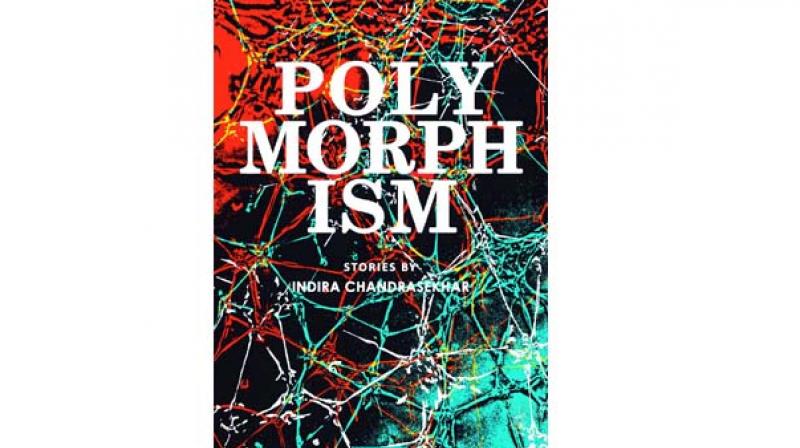Explorations of a diaspora

A scientist that turned to story-telling, ordinary life sparked an urge to document individual meanderings. Living intertwined with a deeper narrative of each protagonist, these 19 stories that debut author Indira Chandrasekhar sifts through, are faces of India lost in their individual turmoils. She writes about pain, fanaticism, infertility, poverty, and the many incidents that create an irrevocable flurry of events that change people. Her stories are spun around scientific ideas, like embryos from a petri dish or government controlled breeding. Polymorphism by HarperCollins is unique is its story-telling, and defiant in some ideas. The Bengalurean who is also behind an aptly named short stories journal online Out of Print, has given the short genre a much-needed boost, “I think human beings are receptive to stories. A story is, after all, one of the cores that holds communities together. Today’s world is, of course, frenetic, demanding, stressful, filled with multiple stimulation. We might not recognise t
he need, nor indeed grant ourselves enough space for stories, but they provide a scaffolding for understanding who we are and where we come from. Stories are a means of making sense of the world. The advantage with short fiction is that it is short. They may be read more quickly as we manage today’s pace of living,” says Indira.
Out of Print celebrates short stories from across the Indian subcontinent. The author had also co-edited the anthology Pangea, Thames River Press, 2012, earlier. Chandrasekhar’s father was a scientist, and her mother an artist, and writer, which in essence gave Indira a proclivity for both worlds.
“I did a Ph.D. in Biophysics and worked as a research scientist examining how the structure and dynamics of a biological molecule or molecular aggregate affects its function. About 10 years ago, my family and I moved from Zurich to Bombay and the intensity of the urban metropolis unleashed the scribe in me,” recalls the writer.
“When I started to publish my own work, I realised there was room for a short fiction platform. Out of Print is the result,” she explains.
No longer a practising biophysicist, her last scientific paper came out in 2006. But the influence of science is spun into her tales, “The influence of scientific work, and ideas have an impact on what I write. The science is always with me,” she adds.
She is currently working on an archival book of the International Music and Arts Society in Bangalore. “The International Music and Arts Society in Bangalore is a remarkable organisation. Envisioned by Rani Vijaya Devi, the sister of the then Maharaja of Mysore Sri Jaya Chamarajendra Wadiyar, the society was set up in the mid-1970s. Looking into the archives has been a remarkable experience of visiting the greats from Rukmini Devi Arundale to Msitislav Rostropovich. The volume will be rich with the biographies of different artists who exhibited or performed for the society, and wonderful anecdotes from different events. The book inherently provides a singular window into the cultural history of the city,” explains the writer who is neck deep in sifting through tomes of material. “There are so many things I could share about the way in which an elegant and intrepid group of people with a commitment to culture began and sustained an organisation. One thing I find noteworthy, is the transition from the sharp bla
ck and white imagery of early photographs Malavika Sarukkai’s debut performance in the city, for example, or MF Husain in his first show, showing his work to SM Krishna to the vibrancy of the colour pictures with someone like the legendary Gayatri Devi of Jaipur.”
About Polymorphism, which peeks into ordinary lives, made extraordinary by their experiences, abuse, patriarchal attitudes come to the fore, Indira explains, “The stories in Polymorphism range from the speculative and slipstream to the more straightforward. In many ways, ones writing self is like a sponge. I am constantly absorbing bits of information that work their way into a story. Thus, responses to politics, societal injustices, the inherent ugliness of patriarchal structures, personal angst, bizarre tales from the extended family, ideas from science, they could all end up forming part of a story. Often times, this process is a subliminal one, and as something writes itself into a story.”
Inspired by an image, a scene on the street, a domestic situation... is how her stories begin to take shape. Busy tweeting about her blog and Out of Print keeps her on her fingertips, “The Urdu translation edition was guest edited with Annie Zaidi, contemporary interpretations of mythology, and the one based on sexual and gender violence was where Samhita Arni and Meena Kandasamy collaborated in the commissioning and editing,” says the TedX speaker, adding, “We recently launched a new project ‘Premise’ where authors and readers send in reviews of the works on Out of Print, and we are able to provide a platform for the literary community. You asked about readership in these social media ravaged times, ‘Premise’ should give us a way to assess the depth of engagement.
Indira calls herself an explorer of life,’ “One not only needs to remain moored to ones values, but one also has to reexamine those values constantly. Writing is one way, I find, to delve more deeply into these explorations,” Indira concludes.

